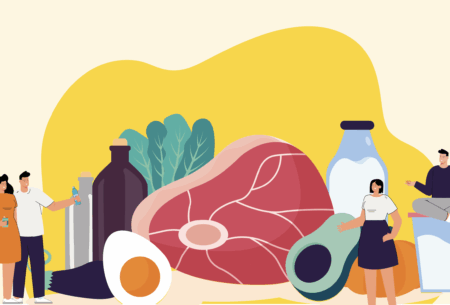Muslims across the world are marking the start of Ramadan this week. One of the most recognised practices undertaken will be the daily fasting – which involves fasting from food and drink between the hours of sunrise and sunset for 30 days.
For our followers that partake in fasting during Ramadan, we’ve put together some top tips on managing nutrition and hydration, as well as keeping on top of your gut health this month.
1) Mirror your normal mealtime routine as much as possible
It’s really important that we eat regularly to nourish our bodies and our microbes (when we are fasting, they are too!). Try to have three meals spread evenly through your non-fasting hours – keep the rhythm of a hearty breakfast and evening meal, and light supper.
2) Balanced meals will keep you fuelled for the days
include whole grain / high fibre starchy carbohydrates (such as bread, pasta, cereals) and lean proteins (meat, chicken, fish, pulses). Always add a side of salad or vegetables, to ensure you’re getting plenty of fibre, vitamins and minerals.
3) Staying well hydrated is key to minimise fatigue and preventing dehydration
Ensuring you drink enough is a MUST. Try to have 1-2 big glasses of water with each meal, as well as sipping throughout the evening. Avoid fizzy drinks which can leave you feeling bloated and uncomfortable.
4) After a long period of fasting be sure to take time with your meals (we know easier said than done!)
Digestion of food starts even before the food enters our gut – be sure to chew each mouthful well. This helps food mix with digestive enzymes in our saliva so that it’s ready to be digested by the stomach which can help reduce excess burping, bloating and discomfort.
5) Limit salty foods as much as possible
As well as being ’not-very-good-for-you’ in general, too much salt in our diets can increase the feeling of thirst, which is tricky to manage when you’re not able to drink in the day. Avoid adding salt at the table, salt to cooking, and limit intake of salty snacks, sauces and processed foods.
6) Don’t forget your super six!
Make sure to squeeze in fruits, vegetables, nuts, seeds, pulses and legumes as much as you can – side dishes and snacks all count too! The fibre content will help to keep you feeling full and ready for the long day of fasting, as well as taking care of your gut microbes during your fast.
7) Fruits and veggies are crucial
Fresh fruit and veg such as cucumber, lettuce, mushroom, tomatoes, melon, apples, oranges and berries have high water contents which will help to keep you feeling well hydrated. Keeping pre-prepared salads, leftover veggies, and chopped up fruit salad in the fridge makes it all that bit easier to get those plant points in when you’re pushed for time!
8) Plan and prepare your meals ahead of the week
After a long day of fasting your body will be craving high energy and fatty foods. Ensure you have planned some nourishing and wholesome meals for opening your fast with, to help fuel your body, and feed your microbes. Check out Eat More, Live Well for some delicious recipes to see you through your fast!
9) Ensure you are practicing nutritional safety
If you have underlying health conditions, are taking regular medications, are undergoing medical treatment, or have any other questions around fasting and your health, please do ensure you speak to your GP or family Doctor if you are planning to fast, and take on board any recommendations they have made.
For those celebrating, we wish you a very Happy Ramadan from all of us at The Gut Health Clinic!












